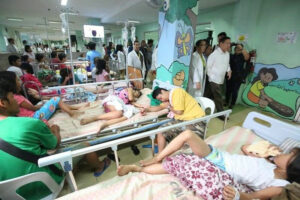MANY GRADUATES of healthcare programs are inadequately prepared to operate in a public-health environment, particularly in delivering community medicine in remote areas, the Ateneo de Manila University said.
“Graduates often enter the workforce without sufficient understanding of universal health coverage (UHC) principles, and there are limited onboarding programs to bridge this gap,” the university said in a statement.
“And since current health and medical education often neglects community health and UHC principles, new graduates are ill-prepared for deployment to underserved areas,” it added.
According to the Department of Health (DoH), UHC is the “provision to every Filipino of the highest possible quality of healthcare that is accessible, efficient, equitably distributed, adequately funded, fairly financed, and appropriately used by an informed and empowered public.”
Republic Act No. 11223, also known as the Universal Health Care Act, mandates that UHC be made available for all Filipinos.
Former Department of Health advisor Anthony C. Leachon said that medical education must be revised to better prepare new graduates to render public health services.
“New graduates often enter the workforce without structured training to integrate them into public health systems,” he told BusinessWorld via Viber. “Integrate public health and UHC principles into medical and nursing curricula to ensure that graduates are equipped for community-based care.”
Mr. Leachon added that current healthcare workers must also undergo training.
“Implement mandatory UHC training for all healthcare workers to align their skills with national health goals,” he said.
Staff shortages are also a factor in providing quality healthcare.
“Due to restrictive hiring policies, nurses and doctors often take on multiple roles beyond their expertise, affecting service quality,” Mr. Leachon said.
Ateneo de Manila said the physician-to-population ratio in the Philippines is 7.92 per 10,000 people, which is under the international minimum standard of 10 per 10,000.
It estimated the nurse shortage at 127,000, much of it in private hospitals.
“Urgent and sustained investment in the health workforce are needed to ensure that universal healthcare is more than just a legal aspiration,” it said. — Almira Louise S. Martinez

